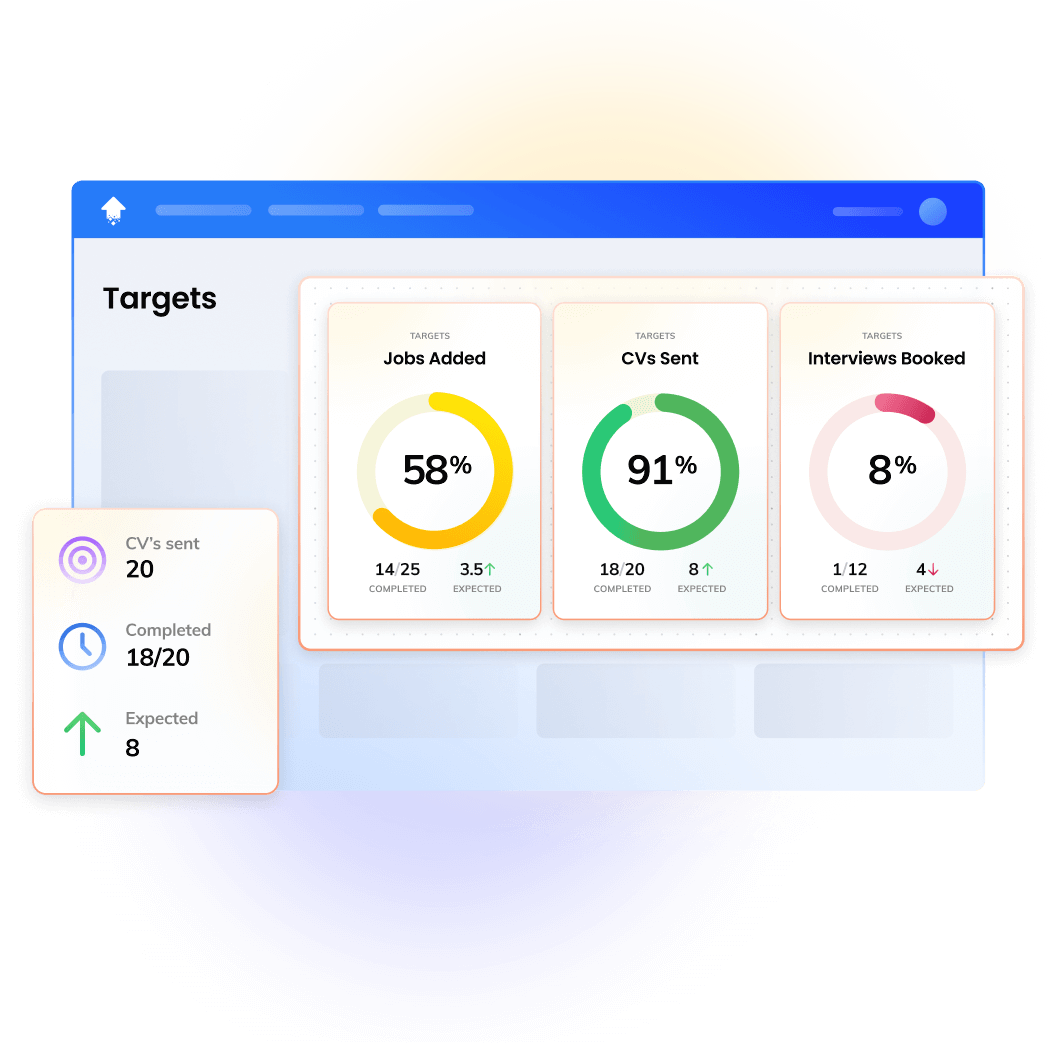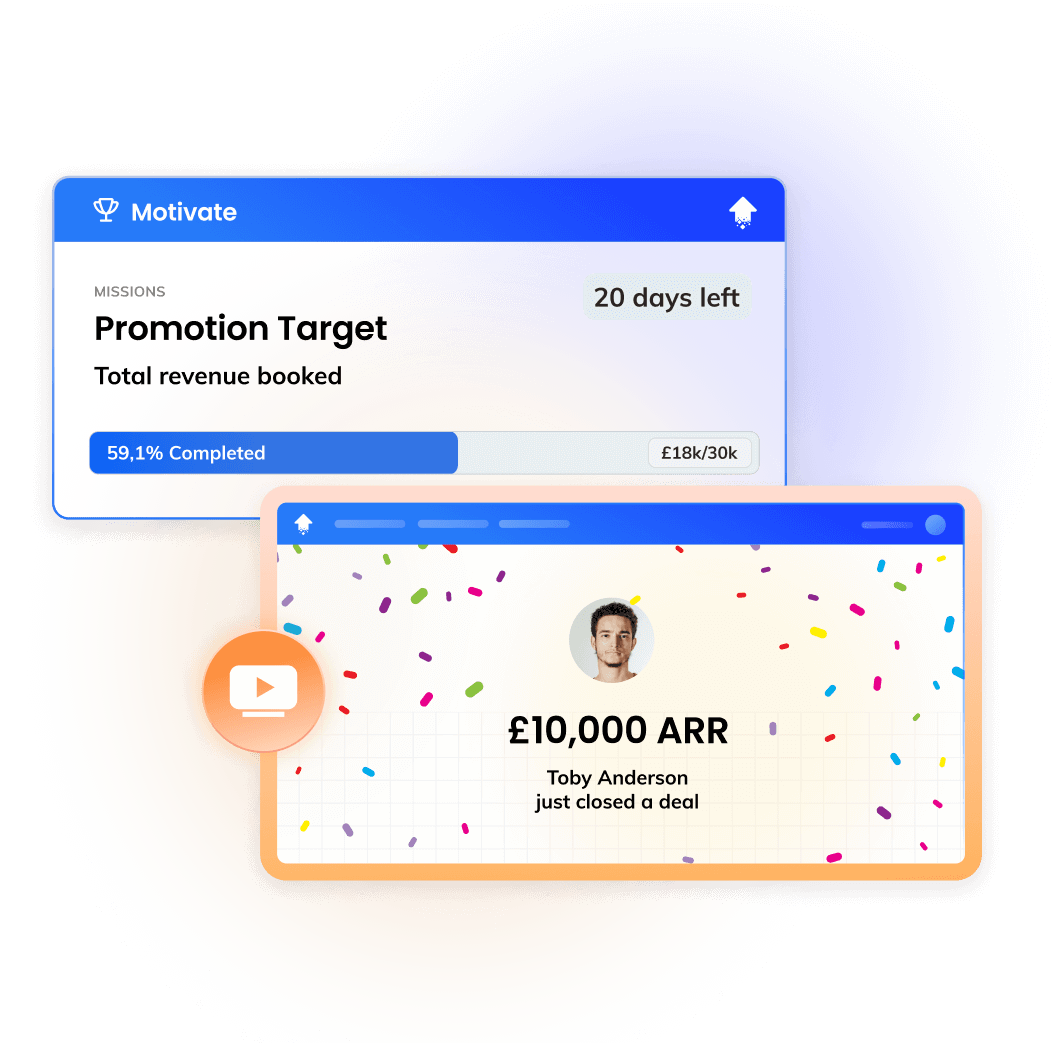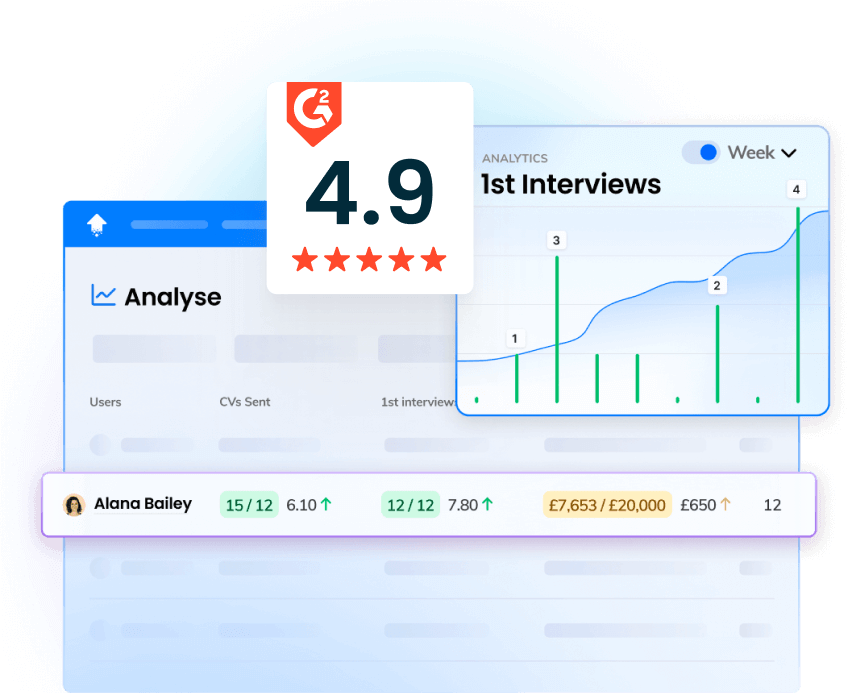10 ways to motivate your sales team
Here are ten proven strategies to motivate your sales team that can be implemented immediately.
1. Building a Trust-based Relationship
If you’re wondering, “how do I motivate my sales team,” start with your own relationships with reps.
A strong manager-employee relationship is the foundation for effective motivational strategies.
And trust is key.
Have you ever worked under a manager who you didn’t completely trust?
Perhaps you didn’t trust they could steer you and your team to success. Did you doubt their competency? Or maybe you didn’t trust they had your best interests at heart?
In those instances, it’s unlikely you felt particularly motivated to do a good job — and make that manager look good.
This is why sales team motivation must begin and end with trust.
Active listening is a key skill for any rep in 2024 — and you should employ this when listening to your team and clients.
Make it your business to gain a deep understanding of your reps’ personal and professional goals — and do everything you can to support them to achieve these targets.
For instance, if a sales rep shares a personal goal of buying a house before the end of the year, look for opportunities for them to achieve promotions, work overtime or bag extra bonuses.
You could also implement an element of flexible working that allows them to attend house viewings during the working day.
Alternatively, if you know one of your reps is keen to specialise in — for example — tech sales, then hand them any tech-related work that comes to the team and arrange relevant training for them.
Furthermore, honesty and transparency are instrumental in building trust with your team.
Be honest with your reps about your goals and capabilities and their performance, and back this up with transparent data accessible to all on the team.
Promised your rep a promotion, a bonus, or some training?
There’s no quicker way to lose the trust of your team than failing to meet promises — even if you simply forgot.
Instead, aim to over-deliver on your promises.
2. Tailoring Management to Individual Preferences
No two sales reps are made the same.
As a manager, it’s your responsibility to treat them as individuals with different ambitions, strengths, weaknesses, and personalities.
And thoughtfully managing with these individual personalities in mind is a huge part of motivating a team.
For example, some reps are motivated solely by money and want you to help them make as much of it as possible.
Others will value your professional expertise and support just as much as their bonuses.
And some team members will be inspired by the camaraderie of being part of a strong team.
Determining how each team member likes to be managed is your job.
The first step is simply asking them about their preferred management style.
There are also many free corporate personality tests you can use to delve deeper into how best to manage and motivate individual team members — for example, 16 Personalities, Personality Perfect, and Enneagram.
One of the most important elements to discover is the level of autonomy and guidance each team member prefers.
Successfully steering employees in the best direction without micromanaging is always challenging for a manager.
But it’s easier if you understand how each team member will react. Ask them whether they prefer to work in a highly guided environment, with plenty of advice and support from day to day, or independently.
Of course, it’s impossible to align perfectly with employee preferences always.
For example, a sales rep who prefers independence struggles to hit their goals.
However, understanding how they will react to your guidance will help you to customise your motivational strategies to each individual.
When customising motivational strategies, consider:
- Goals
- Incentives
- One-to-ones
- Workload
- Personal development plans
- The tone of your relationship with them
- Their relationship with their colleagues
As well as understanding what drives each team member, consider creating happiness maps for your team so you’re always aware of who needs a morale boost and when.
Finally, make team motivation a part of your daily routine.
This is more than worth doing — after all, it’s a highly effective strategy for how to motivate a sales team without money.
3. Goal Setting and Clarity

Setting SMART goals is instrumental to sales performance.
Without clear, well-incentivised goals, sales teams can become directionless, disengaged, and lose morale.
And with cutting-edge tech that illustrates individual and team performance in real-time, progress towards these goals has never been easier to track.
Of course, effective and clear goal setting is central to motivation.
But it’s important to set tiered goals, mixing short-term, easy-to-achieve objectives with the larger long-term targets.
This way, the journey towards hitting the bigger goals is also celebrated, and sales reps get a good sense of progression day-to-day.
First, ensure the team is already adequately covering their basic day-to-day tasks.
Now, set daily, weekly, and monthly goals for each individual team member — and the overall team.
The daily and weekly goals will most likely focus on key sales activities — such as make [X number] of BD calls or book [Y number] of meetings.
Monthly goals should focus more on outcomes, such as bringing in [£X amount] of revenue or selling [Y number] of products.
No matter its size, every goal should be:
- Specific
- Measurable
- Achievable
- Relevant
- Time-bound
When creating your monthly goals, look at your own targets and objectives and consider what each member of your team needs to achieve for you to smash your own objectives.

The daily and weekly goals will then cover the day-to-day tasks that feed into achieving these monthly goals.
All goals must be attainable and realistic to avoid de-motivating your team.
You also don’t want to go overboard: you need all the fundamental sales activities to continue, so consider how your team can fit working towards these goals around their basic duties.
Goal setting is only half the challenge.
Effectively communicating these goals to provide clarity is just as important.
All team members must clearly understand your goals and expectations.
Be sure to go into the ‘why?’ of each goal, too — this will help each team member understand the importance of working hard to hit the goals.
Explain team goals in team meetings and individual goals in one-to-ones.
Support this with custom dashboards for each team member, facilitated by OneUp, one of the best sales productivity tools.
Set up each rep’s goals on their custom dashboard, and watch real-time progress against their targets.
Sales reps can then track their own progress towards these goals in real time, while you can use them to run one-to-ones and team meetings and quickly drill down to easily see the activities that drive your target metrics.
In both situations, remember to set aside time for a Q&A section to ensure the goals are thoroughly understood by all involved.
4. Rewarding and Recognising
Rewards and recognition are the most popular motivation for a sales team - and with good reason.
For sales reps, monetary bonuses are an expectation that is baked into most contracts — a vital requirement for how to motivate sales employees.
But there are other ways to reward reps, from vouchers for restaurants and gig tickets to team dinners, sales recognition programs, and nights out on the company.
For effective incentivisation, let people choose their own rewards from a selection of genuinely desirable incentives that can be customised to the tastes of any sales rep.
Personalised, meaningful and unique rewards help sales reps to feel genuinely valued.
Plus, if you give them something they want, they’ll work harder to secure it.
And, if you’re known for handing out truly great rewards — such as company holidays, for example — this will boost your own employer brand.
Furthermore, recognition is more important than many sales managers recognise.
Indeed, with cutting-edge gamification tech like OneUp, you can build a high-performance culture by recognising each team member’s contribution to your success.
You can:
- Create individual or team-wide goals on custom dashboards or public leaderboards — and incentivise these targets to drive competition.
- Boost engagement and transparency by sharing data with your whole team
- Celebrate success with personalised anthems and automated broadcasts.
What’s more, we have many ways to mark a win in sales — from prize wheels to the trusty old sales bell.
But don’t underestimate the power of a few words of praise in a public setting.
Acknowledge your sales reps’ achievements in front of their colleagues and senior leaders; they will feel truly valued and motivated to keep up the good work.
Support this with personal thanks and acknowledgement of their hard work in one-to-ones and appraisals.
5. Effective Communication Strategies
Communicate, communicate, communicate!
The most effective sales leaders strive to develop a multi-channel communication strategy that ensures their reps feel truly heard and supported.
Moreover, they’ve fostered a team culture of open and honest communication.
This is achieved by consistently supporting and encouraging your team, no matter the issue they bring to you.
No sales rep will be nervous, intimidated, or scared of your reaction when bringing a problem to you — even if it’s their mistake.
Instead, they will want to make you aware of the issue as soon as possible, safe in the knowledge you will remain calm and supportive, and ultimately help them to resolve it.
Of course, this helps you to identify any issues within your business more quickly and start tackling them before they snowball.
And ultimately, if you’re honest with them, they will reciprocate.
Storytelling is a powerful tool to have in your arsenal for effective communication.
Why?
Human nature means we engage with storytelling far more than dry stats or corporate speak.
Indeed, facts are approximately 22% more likely to be retained if they’re communicated as part of a story.
So, when communicating with your team, aim to incorporate a narrative.
Start with a clear central message, then develop a structure with a clear beginning, middle, and end.
Embrace conflict — stories hinge on overcoming challenges and obstacles — and mine your personal experiences for inspiration.
And don’t forget to develop a strong, engaging hook.
You’ll find that honest and transparent storytelling can align team efforts with organisations goals.
6. Fostering Team Cohesion and Wellbeing
When you first become a sales manager, one of the most significant adjustments is your duty of care to your team members.
You are now responsible for checking in on employees’ wellbeing and improving it where possible.
It's important to develop close personal relationships with your team members while maintaining professional boundaries to create a supportive team environment that emphasises well-being.
Casual team activities such as backyard barbecues or group activities can help to blur the line between boss and employee and ensure your reps see you as a human being rather than simply an authority figure.
This will make them feel more comfortable in opening up about their lives to you on both a professional and personal level.
Indeed, you should care about their lives outside work and professional achievements and strive to support them where appropriate.
Happiness interventions, such as surprise treats in the office or informal team gatherings outside work, can improve team cohesion and morale.
Encourage fewer meetings and more breaks.
And support positive relationships within the sales team — for example, between sales development reps and account executives — to ensure smooth collaboration.
Not only does a high level of team cohesion and employee wellbeing mean work will be more enjoyable for everyone — but it also boosts productivity and efficiency on the team, directly impacting the bottom line.
7. Encouraging Autonomy and Personal Growth

Autonomy is the extent to which sales reps can plan their work and make decisions about their workload.
Autonomy is a major driver of employee engagement.
Indeed, research shows that 79% of autonomous workers are engaged at work.
Yet 52% of employees said they lacked autonomy in the workplace.
Micromanagement can lead to low levels of productivity and teamwork, poor morale, increased absences, a loss of ownership, poor personal development, and a high staff turnover rate.
Essentially, no one likes a boss breathing down their neck.
Sales managers should focus on empowering sales team members with the freedom to explore and grow.
Shine a light on personal development, and there is no need to micromanage, as your employees will be more than capable of making decisions around their own priorities.
Give reps the time and space to grow, too, whether this means encouraging them to schedule dedicated learning time or allowing them to decide exactly how, where, and when they will work towards hitting their goals.
To encourage and support personal growth, managers must first understand their reports’ personal and professional goals by gaining their trust and communicating effectively.
8. The Balance Between Work and Play
This is one of the most creative ways to motivate a sales team.
Indeed, the importance of ‘play’ at work cannot be understated.
While it may be something you thought you left behind when you boxed up your toys, making space for play has major benefits in the workplace.
Indeed, it boosts productivity, creativity, and mental and physical health. It encourages teamwork, cuts stress, and supports personal development.
What’s not to like?
There are a variety of ways managers can help employees balance hard work with adequate rest and fun team bonding activities.
Here are some top sales motivation ideas.
Offering remote and flexible working is a popular way to boost work-life balance among employees.
Where possible, offer higher levels of annual leave than competitors, and hand out extra days off as rewards for good performance.
It’s important to review workloads regularly — asking questions one-on-one and monitoring the number and length of breaks employees take.
Running fewer meetings and encouraging a culture of taking adequate breaks is also important.
You can lead by example here — if your team sees you eating lunch at your desk daily or staying late in the office every night, they will feel pressured to do the same.
It’s also important to ensure goals are attainable and don’t cause too much stress.
Another great policy is giving employees paid time off to undertake volunteering activities.
Finally, don’t underestimate the power of team bonding activities, from social events and casual gatherings to group workout classes and scavenger hunts.
9. Sales Contests and Incentives

If you’re wondering how to keep a sales team motivated, sales contents are a tried and tested method.
Why do they work so well?
They’re compelling and engaging and ultimately gamify the sales process, making work more fun.
After all, salespeople, by nature, tend to be a competitive bunch.
Well-designed sales contests have clear goals and are easily tracked from team dashboards.
Find out more about how to track sales performance here.
They also have an attractive incentive attached.
Here’s an example.
Your company has just launched an exciting new product — and you want to start it off strong with a sales competition.
You decide on a revenue target after looking at historical sales data and conducting market research, and considering the sales activities that matter the most to you.
The winner of your competition will be the rep who brings in [£X amount] of revenue from the new product within one month.
You also decide on an appropriate incentive — a monetary bonus, extra annual leave, or entertainment vouchers or tickets.
However, for a sales contest you want your team to work hard at, a strong monetary bonus will likely be the most motivating prize you can give.
First, use OneUp to set up a real-time leaderboard for your competition and display it prominently on screens around your office.
This will clearly show each rep's progress towards the revenue goal, so your team can easily see how they are performing compared to their colleagues.
Now, communicate the details of the competition — and the incentive — to your team.
As sales reps find new customers and upsell and cross-sell to existing ones, continuously direct their attention to changes in the leaderboard to ramp up excitement and motivation.
Provide status updates on the contest in team meetings, and acknowledge strong performance.
Investigate poor performance in one-to-ones and take action to support reps who are struggling.
Ensure OneUp’s individual celebration anthems are set up so that when a rep hits a milestone or achieves the overall goal, their song rings out around the office.
Now praise their performance publicly and privately — essentially make a big deal of it — and deliver that incentive quickly.
10. Getting the right commission structure in place
Ultimately, every employee is motivated by the monthly money in their bank account.
And all this is even more important regarding how to motivate sales reps.
It’s essential to implement the right commission structure for your team.
Remember — different types of commission structures will motivate different types of people and significantly influence your outcomes.
When choosing a commission structure, consider:
- Your goals. Understanding your company’s goals and objectives will influence your decision. For example, gross margin commission is likely the best option if you want your team to make bigger sales. But residual commission could be the way to go if you’re looking to attract long-term clients.
- Ensure the commission is achievable. Sales teams are only going to be motivated by achievable commission structures. Of course, you want to see big results, but it’s important to bear in mind your team's capabilities and the market's state to set realistic commission targets.
- Adapt your commission structure. Ensure you continuously track performance against your commission structure and analyse your model. If it’s not working, adjust and adapt it. And be open to switching to other models if your current structure is not having the desired effect.






